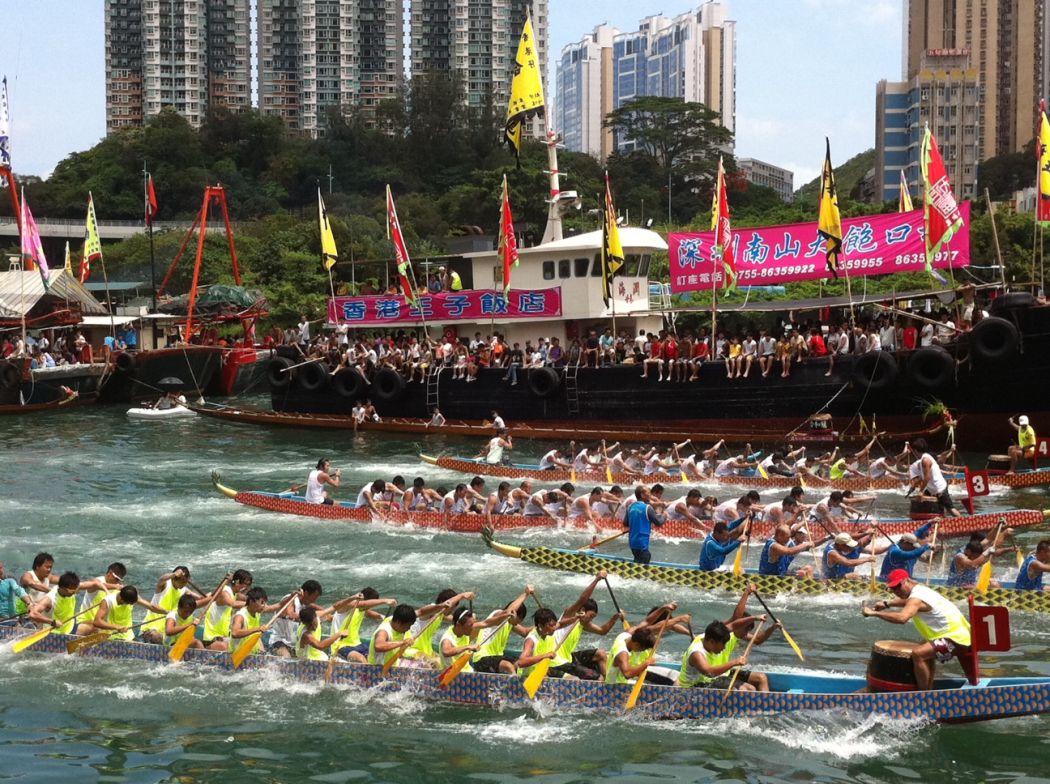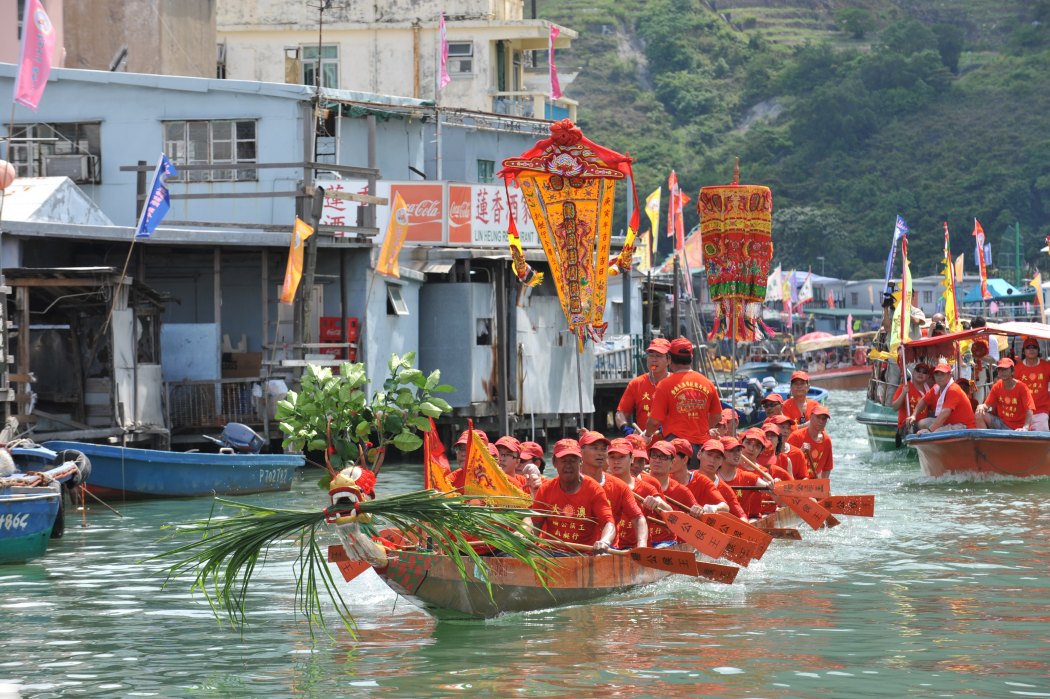By Truston Yu
Tuen Ng, commonly referred to as the Dragon Boat Festival, is celebrated on the fifth day of the fifth lunar month. 2021 marks a significant occasion for dragon boat in Hong Kong and the rest of the world. It has been three decades since this ancient Chinese tradition was institutionalized into a competitive sport, and Hong Kong will be hosting one of the biggest race events later this year.

Today, Tuen Ng is mostly associated with a patriotic statesman called Qu Yuan. Qu was an official in the Kingdom of Chu during China’s Warring States period. After being falsely accused by other court officials and losing favour with the king, Qu committed suicide by jumping into the river. Countrymen paddled on long boats in search of Qu, and tried to scare away the fishes with loud splashes. They threw in glutinous rice dumplings in the hope that fishes would not eat Qu’s body. Legends have it that the tradition of dragon boat paddling was cemented in that era, though there are even earlier historical records of dragon boats. The festival of Tuen Ng itself, however, is not restricted to Greater China – Korea, for example, celebrates “Dano” with a completely different set of traditions.
In Hong Kong, dragon boat is closely associated with the fishermen community. There are many fishermen clubs scattered across the city, and every year there would be races in different regions from Po Toi Island to Tai O. At that time, dragon boat paddling was more of a ritual than it was a competition. Paddlers would focus on the beauty of their paddling techniques rather than pure speed.

Over the years, this ancient Chinese tradition has evolved into a modern competitive sport with international standards and sophisticated regulations. The Hong Kong China Dragon Boat Association was established in 1991, to serve as the official governing body for the sport. The International Dragon Boat Federation was founded in Hong Kong in the same year, setting in place a global framework for dragon boat equipment and racing rules. Wooden paddles and teak wood boats are still used occasionally today, but athletes now train with carbon fibre paddles and fiberglass boats on a regular basis.
Because of Hong Kong’s role in modernizing competitive dragon boat paddling, the city is considered a sacred place by enthusiasts of this sport all around the world. One of the most iconic dragon boat events in Hong Kong is the Dragon Boat Carnival which includes the Hong Kong International Dragon Boat Races. It has been held in the Central Harbourfront in June in previous years, bringing together some 4,000 dragon boat enthusiasts from over ten countries and regions. It is otherwise a rare sight to have dragon boats roaming the Victoria Harbour. For dragon boat enthusiasts, the race course from Admiralty to Central is truly one-of-a-kind.
Unfortunately, the international races have been cancelled for the third year in a row – first due to the Anti-Extradition Law Amendment Bill Movement in 2019 and then the COVID-19 pandemic. The 14th Asian Dragon Boat Championships, which was slated to take place in Hong Kong last year, also had to be cancelled.

Dragon boat is not (yet) a category in the Olympics, but has been featured in the Asian Games and Southeast Asian Games. They are usually called the “Traditional Boat Race” category. The biggest global event is the biennial World Nations Championships which takes place in odd-numbered years. Hong Kong will be hosting it for the second time, since the second iteration of the event in 1997. In early November, the city will be welcoming more than a thousand athletes hailing from all corners of the world. Fourteen national teams will be racing against each other in the Kwun Tong Promenade.
Within Hong Kong, dragon boat has come a long way to reinvent itself as a sport for popular participation. It is particularly safe as there is no physical contact between teams and the boat’s stable structure makes it unlikely to capsize. The low barrier to participation makes it an ideal activity for participants of all ages and all levels. Dragon boat symbolizes unity and community, two important ideals in Eastern culture which many participants hope to cultivate through this sport.
In dragon boat paddling, the individual disappears into the collective. Unlike other team sports such as basketball and football, there are no “star” players in dragon boat racing. People do not wear numbered jerseys, and the whole team has to be synchronized in terms of rhythm and paddling style. Good coordination is far more important than having a few particularly strong players. For the above reasons, dragon boat is an ideal activity for team-building purposes. Companies, organizations, and alumni associations have set up their own teams – even the American Consulate-General has their own “Stars and Stripes Dragon Boat Team.”
The biggest obstacle for an individual is accessing the equipment needed and finding a team to paddle together with. As such, more and more amateur clubs have been set up to accommodate aspiring paddlers not affiliated with any fishermen club or organization. Now, one need not be a professional athlete or member of a fishermen community in order to enjoy dragon boat paddling.

Dragon boat is also an area with big progress in gender justice. While there might still be some old-fashioned people who do not let females go near the boat, the prevalence of mixed categories in races encourages inclusion. As dragon boat is a non-contact sport which relies more on techniques and synchronicity than brute strength, female paddlers can easily compete alongside their male counterparts.
Despite a quiet Tuen Ng this year due to the global COVID-19 pandemic, enthusiasts are hyped up for the upcoming world race in Hong Kong. In defining and propagating Hong Kong’s identity, dragon boat culture is a valuable asset in boosting the city’s soft power. Hopefully by this time next year, the city would be returning to energetic Dragon Boat Festival celebrations as before.
Truston Yu is a dragon boat athlete who has trained with teams ranging from varsity to national levels in Hong Kong, Indonesia, Japan, and Korea. Truston is now completing a degree at the University of Hong Kong.
Support HKFP | Policies & Ethics | Error/typo? | Contact Us | Newsletter | Transparency & Annual Report | Apps
Help safeguard press freedom & keep HKFP free for all readers by supporting our team
| HKFP is an impartial platform & does not necessarily share the views of opinion writers or advertisers. HKFP presents a diversity of views & regularly invites figures across the political spectrum to write for us. Press freedom is guaranteed under the Basic Law, security law, Bill of Rights and Chinese constitution. Opinion pieces aim to point out errors or defects in the government, law or policies, or aim to suggest ideas or alterations via legal means without an intention of hatred, discontent or hostility against the authorities or other communities. |

More HKFP OPINION:
HKFP has an impartial stance, transparent funding, and balanced coverage guided by an Ethics Code and Corrections Policy.
Support press freedom & help us surpass 1,000 monthly Patrons: 100% independent, governed by an ethics code & not-for-profit.










